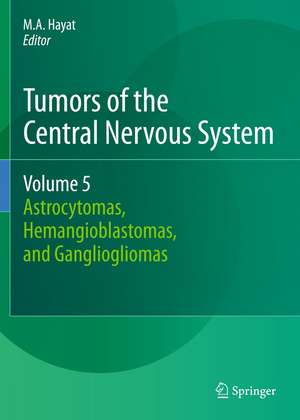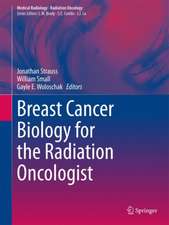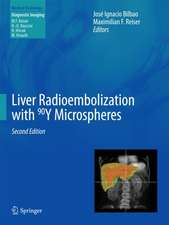Tumors of the Central Nervous System, Volume 5: Astrocytomas, Hemangioblastomas, and Gangliogliomas: Tumors of the Central Nervous System, cartea 5
Editat de M.A. Hayaten Limba Engleză Paperback – 27 noi 2013
The most recent developments in diagnostic and therapeutic aspects of Gliomas (glioblastoma) in the brain are presented. The importance of personalized medicine and clinical validation for targeted therapy are discussed. The identification of various types of biomarkers (determined by molecular genetics) is included, along with their advantages and limitations as markers in tumor detection and diagnosis. The identification and validation of brain cancer (glioblastoma) genes are discussed. The role of cancer stemcells in the initiation and persistence of malignant gliomas is explained; response of glioblastoma cancer stem cells to various growth factors, such as epidermal growth factor receptor kinase inhibitor, is explained. The use of surgical resection, chemotherapy (e.g., temozolomide), immunotherapy, and radiation therapy for glioblastoma patients is included. Biological impediments for chemotherapy and radiotherapy for malignant glioblastoma are pointed out. Standard (established) as well as newer imaging modalities (proton magnetic resonance spectroscopy) are discussed. Also included are proton magnetic resonance spectroscopy in intracranial gliomas, and the use of proton magnetic spectroscopic imaging in determining the infiltration zone in gliomas. The role of molecular signaling in the CNS cancer development is explained, including cell death signaling in glioblastoma multiforme.
| Toate formatele și edițiile | Preț | Express |
|---|---|---|
| Paperback (1) | 995.61 lei 39-44 zile | |
| SPRINGER NETHERLANDS – 27 noi 2013 | 995.61 lei 39-44 zile | |
| Hardback (1) | 1011.74 lei 39-44 zile | |
| SPRINGER NETHERLANDS – 28 sep 2011 | 1011.74 lei 39-44 zile |
Preț: 995.61 lei
Preț vechi: 1048.02 lei
-5% Nou
Puncte Express: 1493
Preț estimativ în valută:
190.52€ • 197.62$ • 158.86£
190.52€ • 197.62$ • 158.86£
Carte tipărită la comandă
Livrare economică 24-29 martie
Preluare comenzi: 021 569.72.76
Specificații
ISBN-13: 9789400738263
ISBN-10: 9400738269
Pagini: 316
Ilustrații: XXVI, 290 p.
Dimensiuni: 193 x 260 x 17 mm
Ediția:2012
Editura: SPRINGER NETHERLANDS
Colecția Springer
Seria Tumors of the Central Nervous System
Locul publicării:Dordrecht, Netherlands
ISBN-10: 9400738269
Pagini: 316
Ilustrații: XXVI, 290 p.
Dimensiuni: 193 x 260 x 17 mm
Ediția:2012
Editura: SPRINGER NETHERLANDS
Colecția Springer
Seria Tumors of the Central Nervous System
Locul publicării:Dordrecht, Netherlands
Public țintă
ResearchCuprins
Introduction. Part 1. ASTROCYTOMAS. DIAGNOSIS AND BIOMARKERS.- 1. Methylation in malignant astrocytomas.- 2. Deciphering the function of doppel protein in astrocytomas.- 3. Astrocytic tumors: role of antiapoptotic proteins.- 4. Astrocytomas: role of wnt/β- catenin/tcf signaling pathway.- 5. Subependymal giant cell astrocytoma: role of mtor pathway.- 6. Role of progesterone preceptor isoforms in human astrocytomas growth.- 7. Astrocytic tumors: role of carbonic anhydrase ix.- 8. Development of cysts in pilocytic astrocytomas: role of eosinophilic granular bodies (method).- 9. Role of synemin in astrocytoma cell migration.- 10. Diffuse astrocytomas: immunohistochemistry of mgmt expression.-11. Central nervous system germ cell tumors: an epidemiology review.- 12. Raf genes and mapk activation in pilocytic astrocytomas.- 13. Biomarker discovery in central nervous system neoplasms: past, present and future.- 14. Astrocytomas: role of taurine in apoptosis using magnetic resonance spectroscopy.- 15. Imaging of hypoxia-inducible factor-1-active regions in tumors using a pos and 123i-ibb method.- 16. Diffuse low-grade astrocytomas: p53-mediated inhibition of angiogenesis.- 17. Spontaneous regression of cerebellar astrocytomas mansoor foroughi, shibu pillai, and paul steenbok.- 18. Subependymal giant cell astrocytoma: gene expression profiling magdalena ewa tyburczy and bozena kaminska. THERAPY. - 19. Time- resolved laser induced fluorescence spectroscopy (trlifs): a tool for intra-operative diagnosis of brain tumors and maximizing extent of surgical resection.- 20. Magnetic resonance-guided laser interstitial thermal therapy for brain tumors.- 21. Nanotechnology-based therapy for malignant tumors of the central nervous system.- 22. Pilocytic astrocytoma: pthological and immunohistochemical factors affecting surgical treatment and surveillance.- 23. Pilomyxoid astrocytoma: chemotherapy hitoshi tsugu, shinya oshiro, fuminari komatsu, hiroshi abe,takeo fukushima, tooru inoue, fumio yanai, yuko nomura. PROGNOSIS.- 24. Astrocytomas: predicting survival and recurrence using cerebral blood volume measurements.-25. Electronic patient-reported outcome monitoring (eprom) in brain tumour patients. Part 2. HEMANGIOBLASTOMA.- 26. Intra-operative icg use in the management of hemangioblastomas.- 27. Hemangioblastoma cysts: diagnosis using fluorescence with 5-aminolevulinic acid.- 28. Hemangioblastoma-stereotactic radiosurgery anand veeravagu, bowen jiang, and steven chang. Part 3.GANGLIOGLIOMA.- 29. Gangliogliomas: molecular pathogenesis and epileptogenesis eleonora aronica and pitt niehusmann.- 30. Epilepsy-associated gangliogliomas: identification of genes with altered expression. Index.
Recenzii
From the reviews:
“This book covers the molecular, medical, radiosurgical, and surgical management of intracranial tumors including astrocytomas, hemangioblastomas, and gangliogliomas. The purpose is to address the most recent advances in the management of these tumors. Neurologists, neurosurgeons, and radiologists are the intended audience. … This is an excellent contribution to neurosurgery and should be part of most academic neurosurgery and neurology libraries.” (Celso Agner, Doody’s Review Service, April, 2012)
“This book covers the molecular, medical, radiosurgical, and surgical management of intracranial tumors including astrocytomas, hemangioblastomas, and gangliogliomas. The purpose is to address the most recent advances in the management of these tumors. Neurologists, neurosurgeons, and radiologists are the intended audience. … This is an excellent contribution to neurosurgery and should be part of most academic neurosurgery and neurology libraries.” (Celso Agner, Doody’s Review Service, April, 2012)
Textul de pe ultima copertă
The most recent developments in diagnostic and therapeutic aspects of Gliomas (glioblastoma) in the brain are presented. The importance of personalized medicine and clinical validation for targeted therapy are discussed. The identification of various types of biomarkers (determined by molecular genetics) is included, along with their advantages and limitations as markers in tumor detection and diagnosis. The identification and validation of brain cancer (glioblastoma) genes are discussed. The role of cancer stem cells in the initiation and persistence of malignant gliomas is explained; response of glioblastoma cancer stem cells to various growth factors, such as epidermal growth factor receptor kinase inhibitor, is explained. The use of surgical resection, chemotherapy (e.g., temozolomide), immunotherapy, and radiation therapy for glioblastoma patients is included. Biological impediments for chemotherapy and radiotherapy for malignant glioblastoma are pointed out. Standard (established) as well as newer imaging modalities (proton magnetic resonance spectroscopy) are discussed. Also included are proton magnetic resonance spectroscopy in intracranial gliomas, and the use of proton magnetic spectroscopic imaging in determining the infiltration zone in gliomas. The role of molecular signaling in the CNS cancer development is explained, including cell death signaling in glioblastoma multiforme.
Caracteristici
Diagnosis of brain tumors, including imaging techniques Therapy for brain tumors and its effectiveness Biomarkers for brain tumors Molecular genetics of brain tumors Genetics of epilepsy
























